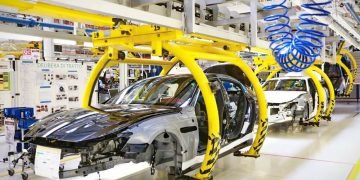Collaborations between automotive manufacturers and logistics firms are rapidly expanding as they work together to develop purpose-built vehicles (PBVs) for a more sustainable transportation system. This shift is driven by the increasing demand for electric trucks over traditional diesel ones, aligning with global efforts towards carbon neutrality. Notably, this collaboration has extended to include the development of logistics delivery robots, marking a significant step towards innovation in the industry.
PBVs, which are electric-powered vehicles designed for specific purposes, have emerged as a key focus area for automakers. Kia, for instance, has secured partnerships with leading Korean logistics companies such as Coupang, CJ Logistics, and Lotte Global Logistics, as well as ride-hailing firms like Kakao Mobility, to supply PBVs. Starting from 2025, these PBVs will be deployed for logistics operations with CJ Logistics and Coupang, showcasing a commitment to sustainable mobility solutions.
One of the key advantages of PBVs lies in their ability to be customized according to specific requirements, allowing for enhanced efficiency and cost-effectiveness. By leveraging insights from logistics companies on factors such as driving distances and operational needs, automakers can tailor PBV models to optimize performance and meet industry standards. This collaborative approach not only enhances the development process but also ensures that PBVs are well-suited to address real-world challenges in the logistics sector.
The outlook for the PBV market appears promising, with a surge in online shopping driving increased demand for logistics services. Additionally, the transition towards electric and hydrogen-powered trucks further fuels the demand for sustainable transportation solutions. Hyundai Motor Group’s projections suggest substantial growth in the PBV market, with PBVs expected to account for a significant portion of global vehicle demand by 2030.
Beyond domestic markets, automotive manufacturers are also forging partnerships with logistics companies on a global scale. GM, for example, has successfully completed PBV production and delivery in collaboration with FedEx, with plans to further expand its PBV fleet. Similarly, Toyota has introduced innovative PBV models like the Kayoibako, catering to diverse transportation needs and showcasing the potential for industry-wide collaboration.
Furthermore, the collaboration between automakers and logistics firms extends to robotics, with initiatives aimed at enhancing delivery processes. Kia’s recent unmanned delivery demonstration with CJ Logistics using Boston Dynamics’ Spot robot exemplifies the integration of robotics into logistics operations. Such advancements underscore the importance of embracing technology to drive efficiency and sustainability in the logistics industry.
In conclusion, partnerships between automotive manufacturers and logistics companies represent a significant step towards developing eco-friendly mobility solutions. By combining expertise and resources, these collaborations pave the way for innovative PBVs and robotics solutions that address evolving transportation needs while contributing to a greener, more sustainable future.























